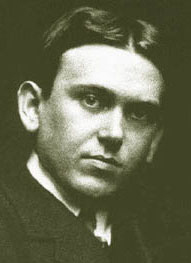

Herausgegeben von Alois Payer (payer@payer.de)
Zitierweise / cite as:
Menken, Henry Louis <1880 - 1956>: : Martyrs. -- Fassung vom 2007-11-16. -- URL: http://www.payer.de/religionskritik/mencken03.htm
Ursprünglich erschienen als Teil von "Advice to young men" in:
Menken, Henry Louis <1880 - 1956>: Prejudices : third series. -- New York : Knopf, 1922. -- 328 S. -- S. 314 - 317. --Online: http://www.archive.org/details/prejudicesthir00mencrich. -- Zugriff am 2007-11-16
Erstmals publiziert: 2007-11-16
Überarbeitungen:
İopyright: NOT_IN_COPYRIGHT
Dieser Text ist Teil der Abteilung Religionskritik von Tüpfli's Global Village Library
Zur Einleitung siehe:
Menken, Henry Louis <1880 - 1956>: : Damn! <Auswahl>. -- Fassung vom 2007-11-16. -- URL: http://www.payer.de/religionskritik/mencken01.htm
|
Martyrs "History," says Henry Ford, "is bunk." I inscribe myself among those who dissent from this doctrine; nevertheless, I am often hauled up, in reading history, by a feeling that I am among unrealities. In particular, that feeling comes over me when I read about the religious wars of the past wars in which thousands of men, women and children were butchered on account of puerile and unintelligible disputes over transubstantiation, the atonement, and other such metaphysical banshees. It does not surprise me that the majority murdered the minority; the majority, even to-day, does it whenever it is possible. What I can t understand is that the minority went voluntarily to the slaughter. Even in the worst persecutions known to history say, for example, those of the Jews of Spain it was always possible for a given member of the minority to save his hide by giving public assent to the religious notions of the majority. A Jew who was willing to be baptized, in the reign of Ferdinand and Isabella, was practically unmolested; his descendants today are 100% Spaniards. Well, then, why did so many Jews refuse? Why did so many prefer to be robbed, exiled, and sometimes murdered?The answer given by philosophical historians is that they were a noble people, and preferred death to heresy. But this merely begs the question. Is it actually noble to cling to a religious idea so tenaciously? Certainly it doesn't seem so to me. After all, no human being really knows anything about the exalted matters with which all religions deal. The most he can do is to match his private guess against the guesses of his fellowmen. For any man to say absolutely, in such a field, that this or that is wholly and irrefragably true and this or that is utterly false is simply to talk nonsense. Personally, I have never encountered a religious idea and I do not except even the idea of the existence of God that was instantly and unchallengeably convincing, as, say, the Copernican astronomy is instantly and unchallengeably convincing. But neither have I ever encountered a religious idea that could be dismissed off hand as palpably and indubitably false. In even the worst nonsense of such theological mountebanks as the Rev. Dr. Billy Sunday, Brigham Young and Mrs. Eddy there is always enough lingering plausibility, or, at all events, possibility, to give the judicious cause. Whatever the weight of the probabilities, against it, it nevertheless may be true that man, on his decease, turns into a gaseous vertebrate, and that this vertebrate, if its human larva has engaged in embezzlement, bootlegging, profanity or adultery on this earth, will be boiled for a million years in a cauldron of pitch. My private inclination, due to my defective upbringing, is to doubt it, and to set down any one who believes it as an ass, but it must be plain that I have no means of disproving it.In view of this uncertainty it seems to me sheer vanity for any man to hold his religious views too firmly, or to submit to any inconvenience on account of them. It is far better, if they happen to offend, to conceal them discreetly, or to change them amiably as the delusions of the majority change. My own views in this department, being wholly skeptical and tolerant, are obnoxious to the subscribers to practically all other views; even atheists sometimes denounce me. At the moment, by an accident of American political history, these dissenters from my theology are forbidden to punish me for not agreeing with them. But at any succeeding moment some group or other among them may seize such power and proceed against me in the immemorial manner. If it ever happens, I give notice here and now that I shall get converted to their nonsense instantly, and so retire to safety with my right thumb laid against my nose and my fingers waving like wheat in the wind. I d do it even to-day, if there were any practical advantage in it. Offer me a case of Rauenthaler 1903, and I engage to submit to baptism by any rite ever heard of, provided it does not expose my gothic nakedness. Make it ten cases, and I'll agree to be both baptized and confirmed. In such matters I am broad-minded. What, after all, is one more lie? |
Zurück zu Religionskritik